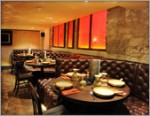This morning it has been quiet enough to do some reading that is way, way overdue, so I've been reading about the history of reading, which is important for my dead-slow-and-stop research. If I have no clue about the context into which 17th century writers wrote, how can I reclaim their work for the 21st century readers? It has been useful to revisit stuff I sort of learned in school about Gutenberg and Caxton and the impact of the printing press on the availability of material and the seeming voracious appetite people had for the printed word. The information explosion that resulted - with the loss of control over content, interpretation and verification - sounds not dissimilar in impact to the web. Pirate publications (those published without authorisation) seem to have abounded, quite whether these were dodgy copies of legitimate works or dodgy works in the first place, is less clear from what I've read, but some sort of early Del Boy could probably have offered you a cut price copy of the Bible - such as the 'wicked Bible' or 'Baskett' translation I recall from my teenage GB project on Bible translation! No doubt publications in plain covers were sold in shady alleys, whilst other people tutted and wondered what the world was coming to.
One of the big concerns for the 'powers that were' was that the masses might form their own interpretations of scripture that differed from the official, received wisdom... including those pesky Baptists, it has to be said. For all that, the apparent practice of communal reading, without following along in your own copy, finds resonance with the way I am led to believe base ecclesial communities in part so Latin America approach the Bible, and which liberation theologians especially try to encourage western churches to do. Even though I love preaching, and the challenge of finding something new to say week by week, the absence of a communal engagement with the text can reduce the sermon to little more than received wisdom in a society where views on authority no longer reflect that practice.
There is obviously a tension between reducing readers or congregations to passive recipients and leaving people to read ancient manuscripts with no guidance whatsoever. So how do we take things forward? Quite a few churches I know 'down south' are moving away from the book-led guided Bible study (such as Lifebuilder series) to a more open-ended approach where people are free to ask questions or discuss things that arise for them. This carries a lot of risk, at worst it becomes the peddling of ignorance and the 'paper-doily-ing' of the Bible whereby hard or scary bits are cut out and cosy, fluffy bits embraced. But at best, it allows 'more light and truth' to emerge. A couple of years ago, I was at a ministers' conference where such approaches were discussed and it was suggested that prior to each meeting one member of the group should do some research using commentaries on the passage(s) chosen in order that she/he could act as a knowledge-pot (my word) to help handle questions. Certainly this seems helpful, though of course she/he is limited by their own choice and interpretation of materials - there is no absolute position.
So where does all this go? Even I the last couple of years I have attended Bible studies (so-called) which consisted of a leader working verse by verse, or even word by word, through a passage and telling her (the leaders were always women!) hearers what it meant. For these folk, the move to the guide-book approach seems a massive and helpful step forward; and certainly over the years I've made use of many such books. Many folk who've used the books for a while realise they probably know all the 'right' answers to the questions and want to dig deeper: 'I know the answer is 'love your neighbour but...' kind of thing. Courage to depart from the list of questions and willingness to leave some questions unasked allow people to explore more deeply the questions that are real (and don't go back next week to 'finish it off'!). From this in time emerges the confidence to engage directly with a text, in all its complexity, to live with questions that find no satisfactory answers, to allow 'more light and truth' to emerge from the familiar and to grow up in our discipleship.
This autumn I am due to start a new Bible study group with a disparate set of disciples. One of the questions I need to explore between this and then is where they might be on this 'spectrum' from passive to active, and how confident or comfortable they are to move along it.
The 'reading revolution' begun by Caxton et al didn't really happen overnight anymore than the 'IT revolution' of our day; as I ponder the practical implications both my church and my research I do well to remember that.
 An Italian eatery called La Vita Spuntini (The Life [of] Snacks) in Glasgow's West End.
An Italian eatery called La Vita Spuntini (The Life [of] Snacks) in Glasgow's West End.